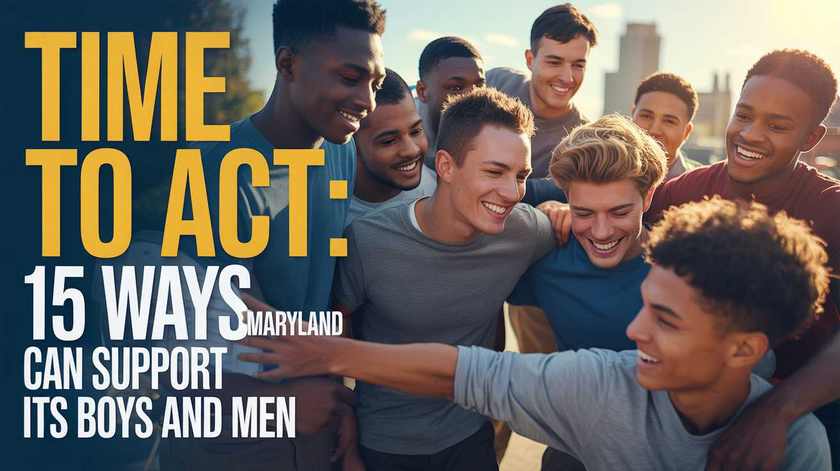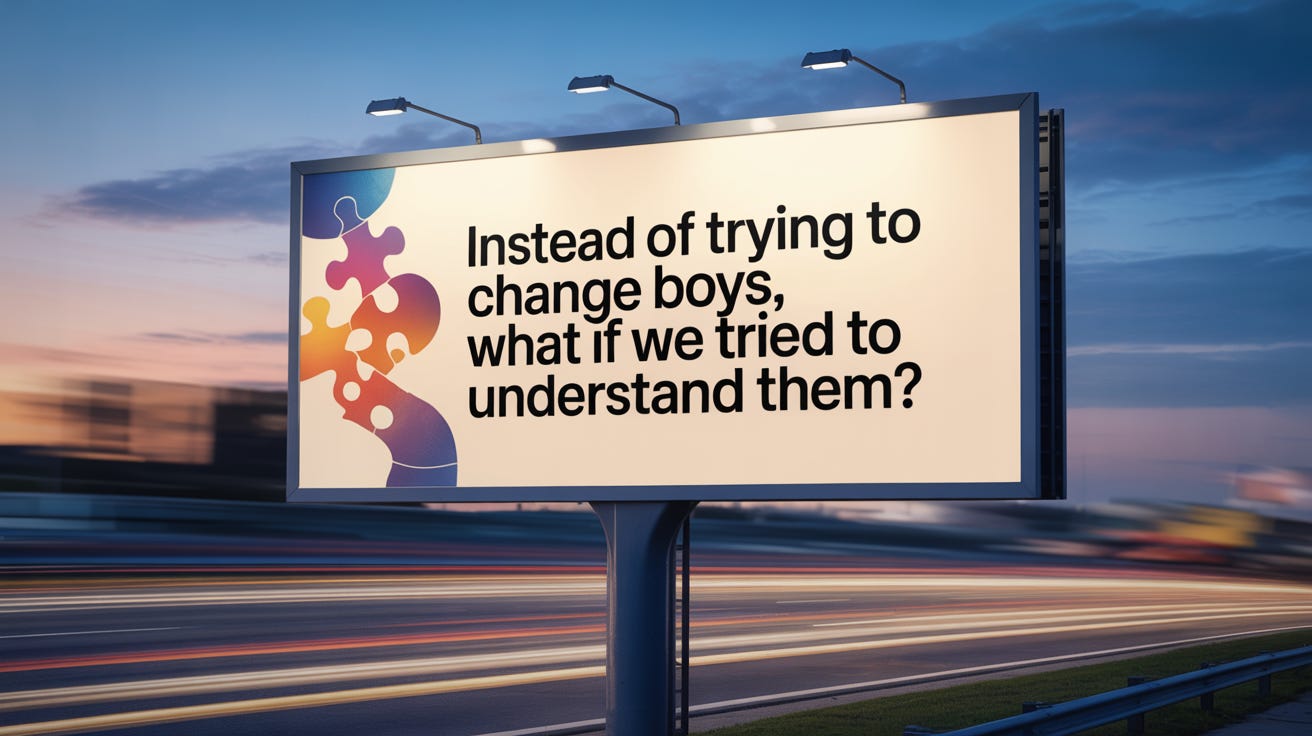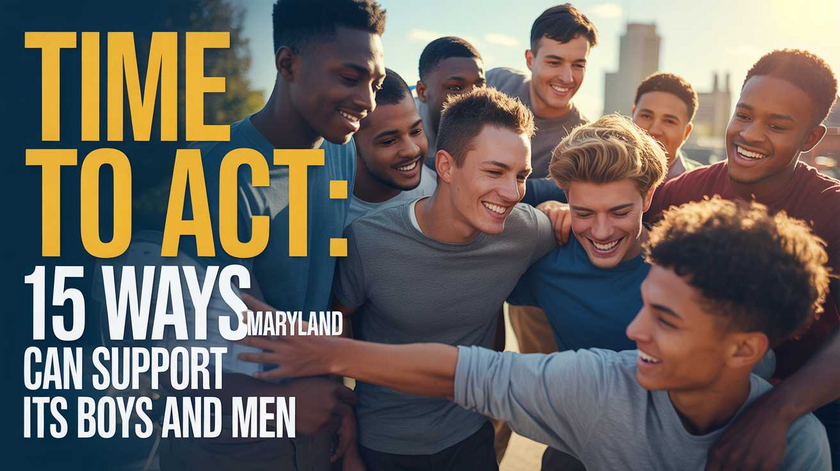
For too long, the challenges faced by boys and men in Maryland have been overlooked. From distorted media portrayals to cultural narratives that paint masculinity as a problem, boys and men are often viewed through a lens of suspicion or deficit. In late April, I presented the following 15 ideas to the Governor’s staff—not a list of services or budget items, but focused proposals aimed at improving the public image and cultural understanding of boys and men in our state. These ideas are about restoring balance, affirming the value of boys and men, and challenging the negative stereotypes that continue to shape policy and perception. If we truly cared about them, this is where we would start.
I would love to hear any ideas you might have for additional items.
IDEAS
1. Using social media to share positive messages about boys and men
For example, on platforms like X.com, we could promote male-positive, research-based messages. I could assemble a group of experts on boys and men to contribute content—brief, impactful posts that could be shared by either the Governor or designated staff. Maybe like this:

2. Publish male-positive op-eds in Maryland newspapers
My team could write short, male-positive articles that the Governor could submit as op-eds to local newspapers. He could choose to take credit for the writing or cite the original sources—either approach would work. The key is getting these important messages into the public conversation.
3. Educate boys about the uniqueness of being male
Introduce age-appropriate lessons in health class, social media, or op-eds, that help boys understand what makes being male unique. For example, boys experience a surge of testosterone in the womb that shapes brain development and influences behaviors like play styles. Later, during puberty, rising testosterone levels can even reduce access to emotional tears. Helping boys understand their many biological differences can foster self-awareness, confidence, and a healthier sense of identity.
4. Father Facts - The Importance of Father Presence
Research has shown that fathers play a crucial role in their children's development. We are finding that many of the things that fathers do automatically with their children are instrumental in the child's development. Simple actions like throwing a child into the air, can aid in the child's later ability to navigate risks. Engaging in rough and tumble play has been linked to reducing future tendencies towards violence. Additionally, a father's role in setting limits contributes significantly to a child's development of empathy. Recognizing these impacts, and many others, can motivate fathers to be more involved with their children, driven by a sense of importance rather than guilt or shame. Dads Matter. These ideas can be shared via tweets, op-eds, in-service trainings etc.
5. Host a statewide essay contest in Maryland public schools
Launch an essay contest inviting boys to write on the topic, “The 5 Best Things About Being a Boy.” Winners could be selected at the school, county, and state levels, across elementary, middle, and high school divisions. Prizes might include a meeting with the Governor or having their essay published in the Baltimore Sun.
6. Distribute low-cost stickers with positive messages about boys and men
We could design simple, inexpensive stickers with messages like “Boys Are Good” or “Maryland Loves Men and Boys.” A local Maryland printer might be willing to donate a large batch—potentially thousands. These could be handed out to young students or used as small prizes and incentives. Students might compete to design the best sticker, and the winners would be used for distribution?
7. Explore donated ad space for male-positive messaging
Look into whether Maryland bus or train companies would be open to donating advertising space to promote positive messages about men and boys.
8. Helping Moms Understand Boys
With the rise in fatherless homes, it's more important than ever to help mothers understand their sons. This was the focus of my most recent book, and there’s so much that moms can learn that makes parenting boys easier and more effective.
What are the key differences between your sons and daughters—and how can you use those differences to better support your son while also making parenting less stressful? Boys often respond better to a different style of discipline and a different approach to handling emotions. When moms truly understand their sons, good things happen—for both of them.
9. Teach young men about the unique ways they process emotions
It’s an important but often overlooked fact that boys, even at a young age, process emotions differently. Teaching this concept can be incredibly beneficial for all boys. One approach is to share stories from cultures like the Dagura people of Africa, where men’s emotional responses are understood and valued differently. This helps boys see the diversity of emotional experiences. Another powerful way is to share stories of men overcoming trauma, such as how Michael Jordan healed after the murder of his father. These narratives can offer insights into emotional resilience and help boys understand their own emotional landscapes.
10. Launch a speaker series on boys, men, and masculinity
Create a speaker series focused on issues related to boys, men, and masculinity. If funding allows, these could be in-person events—but a more accessible and cost-effective approach would be to host them online. Virtual talks could be broadcast live, recorded, and then archived to build an online library of expert insights, available for ongoing education and outreach.
11. Calling Young Men: Share Your Voice
Invite boys and young men to send in short, 15-30 second videos answering this question:
What’s the toughest thing about being a boy today?
Too many boys grow up feeling like no one really cares about their struggles. Let’s change that.
This might allow our young men to speak up, be heard, and know they’re not alone. We’ll compile the videos and publish them to give boys a voice in a world that often overlooks them.
12. Create a Custom GPT Focused on Boys and Men
The technology now exists to upload books and articles into AI and have it answer questions based on that material. With a custom GPT, we can build a powerful tool that provides in-depth, accurate information about boys and men—grounded in trusted sources.
Even better, this tool can be customized to credit the authors and include links to their books or articles whenever their work is referenced. That makes it a win for both the public and the authors: people get reliable answers, and authors gain visibility and support. (I think you all know that I already started one for my books...ask it any question about men/boys and trauma/healing)
13. Encourage Maryland universities to develop Men’s Studies programs
Nearly all universities offer Women’s Studies programs—so it seems like a natural next step to create similar opportunities focused on men and boys. Encouraging Maryland universities to develop Men’s Studies courses or full programs would be a powerful way to foster deeper understanding of men, masculinity, and the male experience.
14. Consider establishing a Men’s Shed
The Men’s Shed movement, which began in Australia, has spread worldwide, though the U.S. has been slower to adopt it. However, the U.S. Men’s Shed Association is a great resource that could offer support. Men’s Sheds provide a space where men can gather, work on projects, or simply relax—whether cooking, watching TV, or enjoying each other’s company. It’s a unique opportunity to create a dedicated place for men to connect and engage in meaningful activities.
15. Begin the process of establishing a Commission for Men and Boys
Maryland has had a Commission for Women and Girls since the 1970s, but there is no equivalent body focused on the needs and challenges of boys and men. Creating a Commission for Men and Boys would provide a dedicated platform to address these issues and promote positive, research-informed policies. It’s a meaningful and necessary goal for greater balance and inclusion. (Actually this idea is getting started with some Maryland legislators expressing interest in sponsoring the bill.)



















